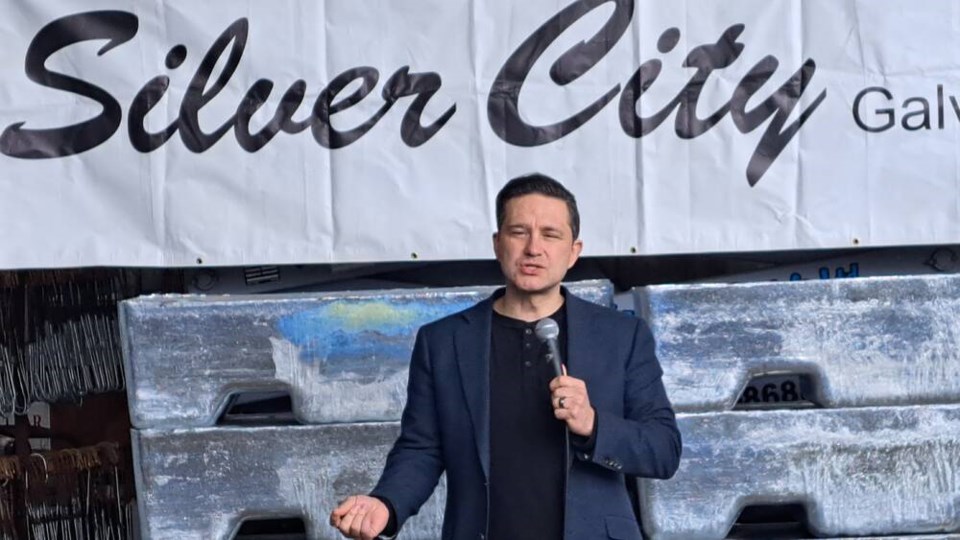Conservative leader Pierre Poilievre brought his axe-the-carbon-tax message to Annacis Island in Delta April 3 at Silver City Galvanizing, where dull steel becomes shiny.
Poilievre told workers during a brief stop that the tax leads to a $1,000 a day cost in natural gas for the plant, and raising the carbon tax, results in galvanized products instead being made in China, using more polluting coal.
“And then we lose the jobs to them, and they emit more pollution into the atmosphere, a counter-productive policy,” Poilievre said.
Poilievre went through several pre-campaign points in rapid fire fashion, saying Canada has the most expensive housing in the G7 because it has the fewest homes.
He said Canada has the second-slowest building permit times in the Organization of Economic Development and Cooperation and that it costs $1.3 million in government permits for each home built in Vancouver.
A Conservative government would require cities to speed up and lower the costs of building permits and require cities to increase the number of building permits issued by 15 percent a year, or risk losing federal funding, he said.
Offering tax write-offs for travel costs for trades people will entice more people to those jobs, he added.
Although Metro Vancouver is awaiting federal support for the Iona Island Wastewater Treatment Plant, and Delta is waiting to hear if Ottawa will pay for the second exit out of the new Fraser River tunnel that will connect to Ladner, Poilievre said only that automobile infrastructure is needed, such as roads, bridges, and tunnels. People need their vehicles to get to work, he said.
“We’re going to streamline, cut the red tape and get these projects built,” he said.
He said he would not commit to funding a new police force to protect Canada ports.
Mayor George Harvie has led the call for port police after the city commissioned a report last year.
But money saved from changes to gun control and reductions in bureaucracy and consultants will be used to bring in scanners and more frontline CBSA officers at Canadian ports and borders to stop gun smuggling and exporting of stolen cars, Poilievre said.
However, the party hasn’t decided on whether Canada’s ports should have a dedicated police force.
“We haven’t made a decision on that yet,” he said.
Poilievre said that (if a Conservative government is elected) cabinet ministers will be banned from any involvement in the World Economic Forum while Canada will ban and expel members of the Islamic Revolutionary Guard Corps.
“We’re going to cut back on foreign aid that ends up in the hands of dictators, terrorists and multinational bureaucracies and we’ll put that money into rebuilding our military who stand on guard for our freedom,” Poilievre said.
As for the media, Poilievre said that the federal government has already damaged journalism through the Online News Act which requires digital media giants to compensate Canadian media and which has resulted in Meta blocking Canadian news from being posted on Facebook and Instagram. “It’s been a disaster,” he said.
Another policy of the present government is the Local Journalism Initiative which provides money to allow media to hire journalists in underserved markets.
Heritage Canada announced in March that it is extending $59 million in funding for three more years for that program.
“We’ll have to see how it succeeds,” Poilievre said.
He said that Conservatives will bring in legislation that will empower local journalism and allow for more journalistic entrepreneurship rather than favouring the big media conglomerates in Ottawa.



